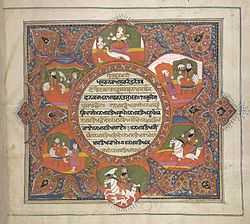Hikaaitaan
| Dasam Granth Dasam Granth - (ਦਸਮ ਗ੍ਰੰਥ ਸਾਹਿਬ)
|
| Banis |
| Jaap Sahib - Akal Ustat - Bachitar Natak - Chandi Charitar Ukat(i) Bilas - Chandi Charitar 2 - Chandi di Var - Gyan Parbodh - Chobis Avatar - Brahm Avtar - Rudar Avtar - Sabad patshahi 10 - 33 Swaiyey - Khalsa Mahima - Shastar Nam Mala - Charitropakhyan - Zafarnamah - Hikayats |
| Other Related Banis |
| Ugardanti - Bhagauti Astotar - Sri Kaal Chopai - Lakhi Jungle Khalsa - Asfotak Kabits - Sahansar Sukhmana - Vaar Malkauns Ki - Chandd - Chaupai Sahib - Tavparsadi Savaiye |
| History |
| Historical sources - Memorials |
| Various aspects |
| Idolatry Prohibtion |
Hikaitaan (Punjabi: ਹਿਕਾਇਤਾਂ), plural of Hikayat, is a title given to semi-legendary set of 11 tales composed in Gurmukhi Persian language[1] whose authorship is historically and traditionally attributed to Guru Gobind Singh. It is the last composition of the Second scripture of Sikhs, Dasam Granth and is believed to be appended to Zafarnamah – The letter to Mughal king Aurangzeb.
Authorship and relation with Zafarnama
As per early Sikh Historical resources, Parchi Patshahi Dasvin (Sevadas, 1741)[2] and Gurbilas Patshahi 10(Kuir Singh, 1751),[3] Hikayats were composed by Guru Gobind Singh at Dina Kangar, Punjab and is part of Zafarnamah which was sent along with Zafarnama. Koer Singh believes that Guru Gobind Singh had written 12 hikayats in Zafarnama.[4] In Sakhi 13, Sevadas mentioned that Guru Gobind Singh had written fables of many kings and also mentioned his own history in zafarnama.[5]
The historical and traditional view is that the all Hikayats was composed by Guru Gobind Singh himself, to make the Aurangzeb realize his folly of breaking oath of Quran, improve his decision making ability on base of facts and to check activities of different departments of Government. Pundit Narain Singh who did exogenesis of Dasam Granth also had the same view. Many of these tales are the Persian translations of the narratives in Charitropakhyan which serves as an additional proof of single authorship of both compositions.[6]
Few modern and self-made scholars claim that Hikayats are not to be part of Zafarnama as in their viewpoint these tales do not show any relevance with the letter[7] and was written by court poets.[8]
Information
- Historically and traditionally, set of tales was written at Dina, Punjab[9] in 1704 AD.
- They are eleven in number and in 752 couplets. Historically, The first Hikayat is Zafarnama which makes its count twelve.
- Each tale starts with praise of the Almighty.
- This composition is present in all old Manuscripts i.e. Mani Singh's, Motibagh's, Sangrur's and Patna's Manuscripts.[10]
- The Language of the composition is Gurmukhi Persian with few words of Majha dialect.
Tales
Following are tales and brief description of the same:
- Tale of Guru Gobind Singh and King Aurangzeb: An autobiography which includes philosophical, political, and satirical aspects.
- Tale of King Daleep and his four Sons
- Tale of King of China: Explaining the qualities of perfect ruler, have Political and Philosophical aspects
- Tale of King Subhat Singh and Bachitarmati
- Tale of King Sabal Singh
- Tale of King Chakrawati and Qazi Daughter
- Tale of King Darab and Queen of Rome
- Tale of Princess of bilistaan
- Tale of King of France and his wife
- Tale of King Mayindra and Advisor's daughter
- Tale of King Sher Shah and Tycoon's daughter
- Tale of Pathan Raheem Khan and his wife: Horror, Slasher and weird story, where woman kills her lover, cooks him and serves to her husband
Relationship with Sri Charitropakhyan
Following are list of Hikayats which are similar to narratives in Charitropakhyan. In fact, many of these are the Persian translations of the narratives in Charitropakhyan.
- Hikayat 4 and Charitra 52
- Hikayat 5 and Charitra 267
- Hikayat 8 and Charitra 118
- Hikayat 9 and Charitra 290
- Hikayat 11 and Charitra 246
The similarity of narratives in Hikayats and Charitropakhyan serves as an additional proof of single Authorship.[6]
References
- ↑ Page 93, The A to Z of Sikhism, W. H. McLeod
- ↑ Parchi Patshahi Dasvin, Sevadas
- ↑ Gurbilas Patshahi 10, Kuir Singh
- ↑ ਫ਼ਰਨਾਮ ਹੈ ਸਭ ਜਗ ਜਾਨੈ। ਲਿਖੀ ਹਿਕਾਯਤ ਦਵਾਦਸ ਤਾ ਮੈ। (ਪੰਨਾ 199), Gurbilas Patshahi 10, Koer Singh
- ↑ ਸਾਖੀ ੧੩ : ਅਗੇ ਸਾਖੀ ਦਸਵੇਂ ਮਹਲ ਕੀ ਤੁਰੀਆਂ: ........ ਓਹ ਖਤ ਮੇ ਕੇਤੇ ਫਰਦ ਲੀਖੇ | ਕੇਤੀਆ ਰੁਬਾਈਆਂ , ਕੇਤੀਆ ਬਾਦਸ਼ਾਹ ਕੀਆਂ ਸਾਖੀਆਂ ਲਿਖੀਆਂ | ਅਰੁ ਕਛੁ ਆਪਣੀ ਹਕੀਕਤ ਭੀ ਲਿਖੀ | ........., Sakhi 134, Parchi Sevadas, Piara Singh Padam
- ↑ 6.0 6.1 sikhisearch.com
- ↑ Dasam Granth,Dr. S.S. Kapoor
- ↑ Page 141, A book of Sikh studies, Gobind Singh Mansukhani
- ↑ Sri Dasam Granth Sahib:Q & A, Kamalroop Singh
- ↑ Sikh Religion, Culture and Ethnicity, C. Shackle, Arvind-Pal Singh Mandair, Gurharpal Singh
